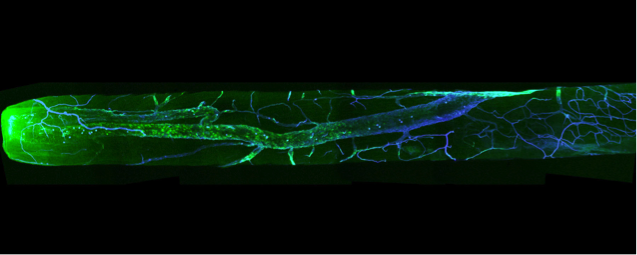Master project – The ocular glymphatic system in diabetic retinopathy
Are you excited about Neuroscience? Would you like to work in an international and interactive group on the latest hot topic: the ocular glymphatic system?
We recently proved the existence of an ocular glymphatic clearance system (Wang et al., 2020). Similar to the brain glymphatic system it clears fluid and wastes from the eye via the optic nerve. In this project we aim to study the dysfunction of ocular fluid flow in diabetic retinopathy utilizing an Streptozotocin induced mouse model. Diabetic retinopathy is one of the leading causes for blindness worldwide. As vascular disease, diabetes is likely to influence glymphatic flow due to pathological changes of perivascular spaces. Promising preliminary data indicates dysfunction of the eye glymphatic system in diabetic mice. Further we question how the brain glymphatic system behaves in the context of diabetes. How do both clearance systems interact in diabetic mice? What vascular and other morphological or metabolic changes that occur in the eye and the brain influence fluid fluxes? How do alterations of fluid dynamics affect disease progression? How could the glymphatic system be targeted to improve disease outcome? What influence do inflammatory changes have on the eye glymphatic system and vice versa?

Fluorescent tracer distribution in the optic nerve (Wang X. et al. Sci Transl Med. 2020, Fig.1 (modified))
The project will mainly include in vivo methods, e.g. intravitreal and cisterna magna tracer injections, tissue preparation (retina, optic nerve, brain) immunohistochemistry, microscopy and data analysis (e.g. fluorescence analysis using Matlab). The candidate is expected to spend a minimum of one year on the project. Thus we are looking for a highly motivated Master student that can preferably already provide a FELASA certificate or is willing to take the course prior to starting or in the early stage of the project.
The project will take place in the Nedergaard lab at the University of Copenhagen. As international research group of more than 30 people and multiple ongoing projects we are highly interactive and ambitious. The Nedergaard lab was the first to describe the brain and ocular glymphatic system. High state of the art research thus requires an open mindset and continuous implementation of novel techniques. In weekly Journal Clubs we discuss latest publications, data, results and ideas with our partner lab in Rochester, USA. Focus groups and data club further provide a great platform to discuss research relevant topics or challenges with colleagues. The lab language is English and international as well as Danish students are welcome. Besides all the Science we also have weekly social events like a running club and soup club or meet outside of work for group activities.
The project will be supervised by Maiken Nedergaard. You would work on the project together with Christine Delle. Christine is a PhD candidate working on the eye glymphatic system since September 2019. The starting date is flexible. Please send your application including a short CV and a short letter describing your motivation for the project to Christine.
Christine Delle - Center for Translational Neuromedicine - Division of Glial Disease and Therapeutics - University of Copenhagen
